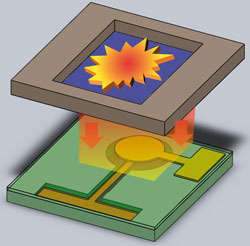
Heat given off by the reaction between the substance of interest and an enzyme is used to determine the amount of that substance present.
Srinivas Tadigadapa and colleagues at Pennsylvania State University have designed a calorimetric sensor as a point-of-care diagnostic instrument that can detect low levels of glucose.
Calorimetric sensors can detect minute heat changes released during biological reactions so could be used to measure trace amounts of clinically relevant biochemicals, such as glucose and urea. But, until now, designing these sensors has been complex and unreliable and the sensors produced have not been robust enough for practical use.
To find out how this recent work overcomes some of these limitations, read Harriet Brewerton’s news article in Chemistry World, and access the paper using the link below:
Monitoring biochemical reactions using Y-cut quartz thermal sensors
Kailiang Ren, Ping Kao, Marcelo B. Pisani and Srinivas Tadigadapa
Analyst, 2011, Advance Article
DOI: 10.1039/C1AN15153C










